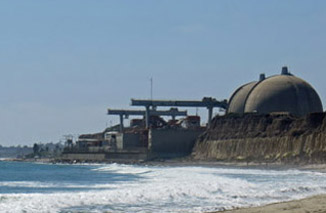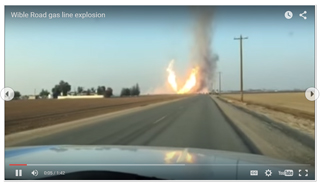Category Archives: Latest In Consumer News
Uber Drivers Get Big Boost In Lawsuit Against Company
by Carolyn Said, San Francisco Chronicle

U.S. District Judge Edward Chen ruled that even drivers who accepted mandatory arbitration in their Uber contract should be included in the [class-action suit], saying that clause was unenforceable. That means the majority of the 160,000 people who have ever driven for Uber in California are now part of the class. … If the drivers win, [their lawyer] has said she’ll next seek a nationwide class-action. … The Uber class-action is the furthest along of a bevy of lawsuits against companies such as Lyft, Postmates, Instacart, Caviar and Handy in which gig workers are seeking the protections and rights of employees. Read More ›
Edison Fined $16.7 Million For ‘Secret’ San Onofre Chats
by Teri Sforza, Orange County Register

“The CPUC could have thrown the book at Edison, with maximum penalties of $41.75 million, which would have sent a much stronger message than a paltry $16.74 million,” said Mindy Spatt, spokeswoman for The Utility Reform Network, a consumer group that has pulled out of the San Onofre settlement agreement. “Edison may be left with the impression that the CPUC doesn’t take their violations of the ex-parte rules all that seriously. This money will go to the state general fund, not customers, who would be best served by the commission reopening the case and returning more money to customers,” Spatt said. Read More ›
From Warsaw To SF, The Roots Of Edison’s Historic Fine
by Chuck McFadden, Capitol Weekly

[The CPUC] levied the unprecedented fine as punishment for failing to disclose a series of meetings and emails, and for providing misleading testimony pertaining to the costs of shutting down the San Onofre Nuclear Generating Station. Southern California Edison owns 70 percent of the station. … Left hanging was the question of whether the commission would revisit a previously approved settlement deal that has ratepayers coughing up to 70 percent of the $4.7 billion cost of shutting down San Onofre. … The $16.7 million fine is the largest ever imposed on a utility for these specific violations. Read More ›
San Bruno Says PG&E Too Cozy With CPUC’s Mike Florio
by Jaxon Van Derbeken, San Francisco Chronicle

Newly released documents show that PG&E executives had meetings, e-mail exchanges and other communications with utilities commission member Mike Florio that were conducted without public notice. … Florio was a key player in several regulatory proceedings that grew out of the San Bruno [natural gas explosion]. … Florio also oversaw the process that determined how much PG&E customers would have to pay to bolster pipeline safety following the disaster. In December 2012, the commission voted to have customers cover more than half the $2.2 billion in pipeline safety upgrades. Read More ›
Judge: Regulator Should Release Brown E-Mails On Nuclear Shutdown
by Jaxon Van Derbeken, San Francisco Chronicle

The 65 e-mails that [Gov. Jerry Brown and CPUC officials] either sent or received date from 2013 and 2014. “It appears from the record that CPUC and officials from the governor’s office, including the governor himself, were involved in the discussions at the CPUC regarding the San Onofre” [nuclear plant shutdown, attorney Maria Severson told San Francisco Superior Court Judge Ernest Goldsmith]. “The interest of public disclosure as to who and what was behind the decision to make utility customers pay over $3.3 billion for the errors of Edison is of vital importance.” Read More ›
PG&E Could Face Steep Fines For Banned Exchanges With Regulators
by Rebecca Bowe, KQED

[One case concerned a CPUC] decision to award millions to PG&E as a reward for satisfying energy-efficiency goals, even though consumer advocates argued that the company hadn’t successfully hit the targets. … PG&E started to face major public scrutiny for its cozy ties to utility regulators after a trove of emails were released in court proceedings initiated by the city of San Bruno in the wake of the deadly 2010 pipeline explosion. … “We’ve said again and again that the rules are much too lax,” [said Mindy Spatt, a spokeswoman for The Utility Reform Network (TURN)]. “We and our allies will be pushing for the maximum penalty.” Read More ›
Paris Attacks Spark Another Fight Against Encryption
by Sean Sposito, San Francisco Chronicle

[Encryption “back-doors” for law enforcement] won’t necessarily weaken terrorist organizations’ ability to communicate with each other over the Internet. … But what it could do is make it easier for criminals and terrorists to access our financial, medical and other personal records, said Pam Dixon, the executive director of the World Privacy Forum in San Diego. They might find a way through the back-door as well. “Strong crypto means good security for all of us,” she said. “It means that banks and hospitals can secure financial and other transactions in our digital world.” Read More ›
Nonprofit Blue Shield Accused Of Backing Out Of $140-Million Charity Pledge
by Chad Terhune, Los Angeles Times

Blue Shield’s corporate conduct has come under intense scrutiny for the past year after officials revoked its longtime state tax exemption. Auditors at the California Franchise Tax Board criticized the insurer for stockpiling “extraordinarily high surpluses” of $4 billion and for failing to offer more affordable coverage as a nonprofit. California Insurance Commissioner Dave Jones is also investigating Blue Shield’s disclosures on executive compensation. Read More ›
85,000 Additional Corinthian Students To Get Fast-Track Debt Relief
by Chris Kirkham, Los Angeles Times

There was enough evidence to conclude that Everest’s California and online campuses, along with California WyoTech schools, had deceived students by overstating job placement numbers. … [The California Attorney General’s Office] alleged in a lawsuit filed in 2013 that Corinthian had overstated job placement rates by counting graduates who were employed at temporary staffing agencies or one-day health fairs. In some cases, according to the complaint, Corinthian had paid staffing agencies to hire students in order to satisfy accrediting entities. Read More ›
One Dead And Three Injured In PG&E Natural Gas Line Explosion Southwest Of Bakersfield
by Steven Mayer, J.W. Burch IV, James Burger and John Cox, The Bakersfield Californian

“Unfortunately the vehicle and house (near the blast) were all but gone and a hay barn also was burning,” [an eyewitness] said in a text. “I don’t see how anyone still in the house could’ve survived once the flames got there.” The push of gas and flames threw trees into the air, she said. … [PG&E] said automatic valves initiated a shutoff, but that assertion was contradicted by local fire officials. Read More ›
New California Data On Ride Services Reveal Rise In Collisions And Incidents
by Bryan Goebel, The California Report

“If it’s normalized by miles driven, you’d expect the number of incidents to be somewhat stable over time,” [UCLA transportation expert Juan Matute told the CPUC]. “That would be indicative of TNCs being less safe as they scale up.” … In 2013, an Uber driver was charged with vehicular manslaughter for hitting and killing 6-year-old Sofia Liu as she and her family were walking in a crosswalk. … [Uber] was threatened in July with suspension and a $7 million fine by an administrative law judge for failing to meet all the [CPUC] reporting requirements. Read More ›
One Dead And Three Injured In PG&E Natural Gas Line Explosion Southwest Of Bakersfield
by Steven Mayer, J.W. Burch IV, James Burger and John Cox, The Bakersfield Californian

“I don’t see how anyone still in the house could’ve survived once the flames got there,” said an eyewitness. The push of gas and flames threw trees into the air, she said. PG&E said automatic valves initiated a shutoff, but that assertion was contradicted by local fire officials. Read More ›
This Smart TV Takes Tracking To A New Level
by Andrea Peterson, The Washington Post

Vizio, a top television maker, automatically tracks the viewing habits of Smart TV owners and shares that information with advertisers in a way that could connect those preferences to what those customers do on their phones or other mobile devices. … There are laws that limit how companies share information about video watching habits, including the Video Privacy Protection Act (VPPA). However, Vizio says that those laws do not apply to its tracking service because the company associates IP addresses with the data rather than a person’s name or other “personally identifiable information.” Read More ›